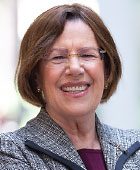Looking Outward Globally: More Important Now Than Ever

The United Nations headquarters reopened in January, and this means that APA, granted special consultative status in 2014, is entitled to have access to the U.N. once again. Since 2014, APA has participated in global events that explore topics such as the status of women, racism and discrimination, migration, traumatic exposures, climate change, human rights, and violence. Globalization and global mental health are areas in which APA can play a leading role.
In February, APA participated in an invitation-only conference by the United Nations Office on Drugs and Crime. This gave APA an opportunity to educate participants about addiction, criminalization of drug use, human trafficking, and other relevant topics.
March is Women’s History Month. The U.N. Committee of the New York County Psychiatric Society will present a panel discussion at the 66th U.N. Commission on the Status of Women, which is being held from March 13 to 25. The session, which will be held March 24 at 2 p.m., is titled “Mental Health Stressors and the Unspoken Barrier for Women’s Economic Empowerment.” Those who are or become a member of the Committee on the Status of Women, a nongovernmental organization (NGO), may log in to the panel discussion as well as be invited to many other U.N. activities. To join, go here.
APA members have also been involved with the International Psychoanalytical Association (IPA), also an NGO of the U.N. Its panel presentation, titled “From Resistance to Recognition: A Psychological High Road to Decent Female Care Work,” will be held March 22 at 4 p.m. Both APA and the IPA are members of the NGO Committee on Mental Health, which is also open to new members. To join, go here.
Some APA members know that as a past chair of the NGO Committee on the Status of Women, I had the responsibility of guiding this coalition of one hundred NGOs that represented approximately 10 million members. The committee continues to have a powerful presence to educate and advocate for women worldwide. We often worked with women who live with psychological, economic, physical, cultural, and social inequity. We were successful in supporting their human rights on many occasions. For example, we aided in the release of imprisoned women, helped prevent a forced marriage for an 8-year-old girl, and participated in the rehabilitation of former child soldiers. All of this was accomplished through diplomatic dialogue between mental health professionals and sovereign leaders.
The APA Council on International Psychiatry and Global Health and the APA Caucus on Global Mental Health have produced excellent guidance documents and other materials. Developing global mental health curricula for residency training programs is just one of the resources that is posted here.
Involvement in the wider world gives APA members a perspective that includes the role of civil society. It is a reminder that psychiatrists can have a voice in social education, policy, and programs. COVID-19 and political divisions have turned the world upside down, and many people are confused, frightened, and frustrated. Fueling these feelings have been individual isolation and misinformation that has led to needless deaths. It is a vicious cycle. However, a view of the wider world provides a context for the problems that face psychiatrists today. ■



